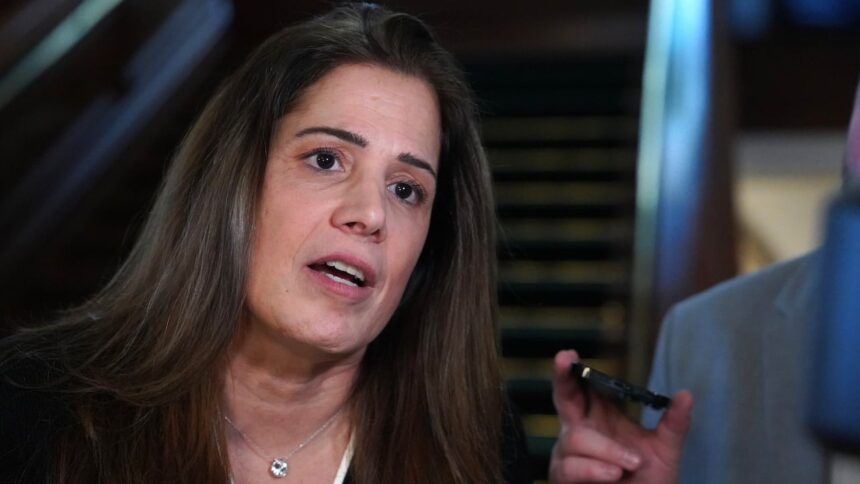Montreal’s academic landscape faced significant turbulence yesterday as hundreds of CÉGEP teachers and support staff gathered outside the offices of Quebec Education Minister Bernard Drainville, their voices unified in calls for his resignation amid growing frustration over educational reforms and working conditions.
The demonstration, organized by the Montreal regional council of the Centrale des syndicats du Québec (CSQ), brought together union members from several institutions across the island, creating a sea of protest signs and impassioned chants along René-Lévesque Boulevard in downtown Montreal.
“We’ve reached a breaking point,” explained Marie-Claire Thériault, a humanities professor at Dawson College who participated in the protest. “Minister Drainville has repeatedly failed to address the real challenges facing our CÉGEP system, preferring political posturing over meaningful dialogue with those of us in the classrooms every day.”
At issue are several contentious policies introduced by Drainville’s ministry over the past year, including proposed changes to curriculum standards, increased administrative oversight, and what union representatives describe as “inadequate” responses to staffing shortages that have left many departments stretched beyond capacity.
The protest comes just weeks after negotiations between the provincial government and education sector unions reached an impasse, with teachers rejecting what they characterized as insufficient offers regarding workload adjustments and compensation.
“When we talk about student success, we need to recognize that it depends on having educators who aren’t burned out and overworked,” said Jean-Philippe Vaillancourt, president of the Fédération des enseignantes et enseignants de CÉGEP (FEC-CSQ). “What we’re seeing is a minister who doesn’t grasp the everyday reality in our institutions.”
Particularly contentious is the minister’s recent directive regarding standardized assessment practices, which many educators argue undermines the pedagogical autonomy that has long been a cornerstone of Quebec’s distinctive CÉGEP system.
The protest wasn’t limited to faculty concerns. Support staff, including laboratory technicians, librarians, and administrative personnel, joined the demonstration in solidarity, highlighting how ministerial policies affect the entire educational ecosystem.
“When Minister Drainville cuts resources or imposes new administrative burdens, it’s not just teachers who feel the impact,” noted Sylvie Lapointe, a laboratory technician at Collège de Maisonneuve for over twenty years. “The entire support infrastructure that makes quality education possible becomes strained.”
Students, while not officially organizing the protest, showed support in significant numbers. “Our education isn’t just about buildings and books—it’s about the people who guide our learning,” said Alexandre Côté, a second-year social science student at Vanier College who joined the demonstration. “When our teachers are fighting for better conditions, they’re really fighting for our education too.”
The Ministry of Education responded to the demonstration with a brief statement indicating that Minister Drainville “remains committed to dialogue with all education partners” and that “many of the concerns expressed are being addressed through ongoing negotiations.”
This response drew immediate criticism from union leaders, who characterized it as dismissive of the gravity of the situation. “If the minister truly valued dialogue, we wouldn’t be in the streets today,” countered Vaillancourt. “Words need to be followed by concrete actions.”
The Montreal protest reflects broader tensions in Quebec’s education sector, where recent reforms have generated considerable controversy. Last month, similar demonstrations occurred in Quebec City and Sherbrooke, suggesting a province-wide movement gaining momentum.
Montreal’s unique position as home to both French and English CEGEPs adds another dimension to the protest. Teachers from both linguistic communities expressed shared concerns about the direction of educational policy, creating rare solidarity across traditional divides.
As rain began to fall in the afternoon, protesters remained undeterred, their determination perhaps best captured by Marie-Hélène Bonin, an English professor at Collège Ahuntsic: “We’re educators—persistence is in our DNA. We’ll continue advocating for our students and our profession until meaningful change occurs.”
Whether this demonstration will influence ministerial policy remains uncertain, but its message was unmistakable: Montreal’s CÉGEP community demands to be heard, and the pressure on Minister Drainville shows no signs of abating.
As the academic year progresses, the relationship between Quebec’s education ministry and CÉGEP unions will likely remain strained unless significant steps toward reconciliation are taken. For now, the call for the minister’s resignation stands as a stark indicator of just how deep the divide has become.







